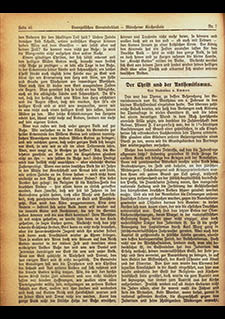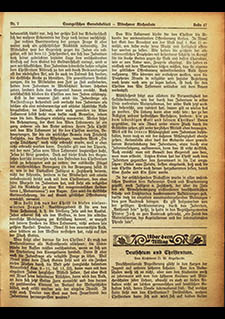Protestants and the “Jewish Question”
Since the close of the 19th century, old religious anti-Judaism in German Protestantism had been overlain by a modern anti-Semitism, which was partly political and cultural and partly already defined by racism. The “Jewish Question” also preoccupied the church’s center in the Weimar era. “The Jews” were a much discussed topic in Protestant Sonntagsblätter (Sunday weeklies).
A lecture delivered by Pastor Friedrich Langenfass on February 4, 1921 in Munich, which was widely reviewed in the Evangelisches Gemeindeblatt für München (a Protestant weekly), included an array of anti-Semitic stereotypes of that day. Out of Christian motives, Langenfass rejected anti-Semitic racial theory and violent suppression of Judaism. Nonetheless, he demanded emancipation from internal bondage to Judaism, which would be followed by emancipation from external bondage.
Hans Meiser, director of the Evangelical Lutheran Church in Bavaria’s theological seminary, published a series of articles on “The Protestant Community and the Jewish Question” in the Nuremberg Evangelisches Gemeindeblatt in the summer of 1926. Meiser’s remarks were imbued with racial anti-Semitism but he simultaneously rejected racial materialism and called for racial betterment by evangelizing to and baptizing the Jews.
In 1932, Pastor Kurt Hutten published a substantial four-part series of articles on the “Jewish Question” in the Materialdienst des Evangelischen Volksbundes in Württemberg, which was widely read by pastors. Hutten distinguished between traditional and racial anti-Semitism and declared himself in favor of the former. Negative Jewish influences in the arts, media and politics had to be combatted.
Source / title
- © Bayerische Staatsbibliothek


